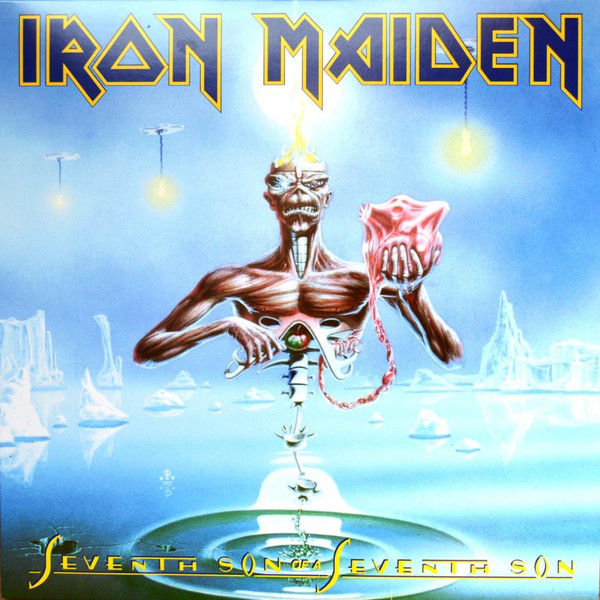Iron Maiden are a band whose name I have always known, but it is only in recent months that I have felt the impulse to actually investigate their work outside of a best of compilation. Crucial to my interest being tweaked has been the ongoing series of documentaries which have been generously provided on the band’s own YouTube accounts, and chart the history of the band.
One of the most entertaining sections of these documentaries shows a mid 80s conversation between front man Bruce Dickinson and a young fan who confesses his aspiration to record heavy metal album with synthesisers. Bruce, who appears to have enjoyed the odd shandy poor to this chat, amiably shoots the poor fan down, by repeatedly stressing that ‘You can’t do Heavy Metal with synthesisers’.
It is now 30 years since the release of Seventh Son of a Seventh Son, the album on which Iron Maiden does Heavy Metal with synthesisers, the last of a string of 80s albums which saw them become ever more slick and sophisticated in their approach to full throttle NWOBHM. Their proggiest album to date, Seventh Son of a Seventh Son was also one of Iron Maiden’s most collaborative albums. True, galloping bass man Steve Harris was still the creative director, but all band members were evidently pulling in the same direction, and Dickinson in particular was enthused, a huge about-face from when his contributions for 1986’s Somewhere in Time were dismissed for not being Iron Maiden enough.
Listening back to Seventh Son of a Seventh Son now, while it does sound like a heavy metal album of its era, at least it is a good one. Less poppy in their approach than Def Leppard, NWOBHM’s other mega-act, Iron Maiden nevertheless managed to release a string of accessible hard rocking singles during the 80s, and on Seventh Son of a Seventh Son, they had two of their best in “The Evil That Men Do”, and “Can I Play With Madness”, the latter of which is up there with “Run to the Hills” as the most commercial Iron Maiden single of their career.
Seventh Son of a Seventh Son is not just about big hits though, as the title track is one of the band’s best moments, as is “The Clairvoyant” is a key track in the evolution of Iron Maiden. In fact the entire album hangs together as a pleasing whole, despite the slightly less wieldy lengthier numbers and a somewhat heavy handed concept that the songs are draped around. The riffs are big, the rhythms gallop along, the whole thing is unmistakably British Heavy Metal, and Dickinson was always one of the most immediately recognisable rock vocalists of his generation. If there is one grumble I have about Seventh Son of a Seventh Son, is that at 8 tracks long, it is one track away from having a rather pleasing symmetry with its title, though obviously, to do so would have perhaps been a little too on the nose.
Seventh Son of a Seventh Son is evidently one of the key Iron Maiden albums, and the one which saw the culmination of their evolution of their sound that had been becoming ever more slick and sophisticated since their debut album. It is the album which they took a bit of a punt and achieved huge access in Europe, while North America were just a little bit baffled that Iron Maiden had got a bit more complicated than they were expecting.
Post Seventh Son of a Seventh Son, Harris would steer Iron Maiden towards a more back to basics approach, thus prompting guitar player Adrian Smith to hand in his notice, and kick-starting a series of events that would see Iron Maiden endure mixed fortunes throughout the 90s. Seventh Son of a Seventh Son is therefore the last album before they went into a decline.
Quite where my exploration of the work of Iron Maiden goes from here remains to be seen. Certainly the rest of their 80s output seems to be worth the time to seek out. That said, I have yet to hear anything which proves that they were anything other than the key band to come out of NWOBHM.














No Comment